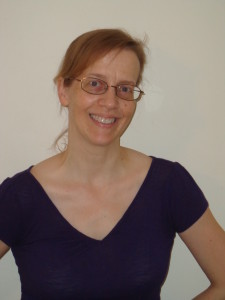
The process of getting a book into an audio format is long, challenging, and fun. For this book, I worked with Michelle Babb, and I thought you might enjoy getting to know how she does it.

Karen: How did you get started as a narrator?
Michelle: I’ve always loved reading aloud. When my kids were little I read the Harry Potter series to them and they always insisted I “do all the voices.” I did some theater in high school and college, and did graduate work in a major metropolitan area, and I think I’ve just always noticed accents and dialects, and had fun imitating them. Then in 2013 an acquaintance mentioned that she was listening to an audiobook, and that her interest in the book was affected by the skill and style of the narrator, and she said, “you’d be really good at that,” and I thought Yes, I think I would! So then of course I went to the Fount of All Knowledge, Google.com, and from there I found voices.com and acx.com, and I bought a microphone and learned how to upload an mp3, and I’m completely hooked.
Karen: Tell us about the actual process of narrating a book.
Michelle: Well, there’s the drama-queen aspect of it, which I love, and then there’s the tedious, meticulous editing process, which I also love. I narrate in the closet in my spare bedroom, with clothes hanging around me to absorb sound and decrease the reverb. I’ve got the microphone sitting on a tiny end table (cushioned by a sweatshirt), and I’m sitting on a Swiss ball (because the chair I had squeaked too much). And I’ve got a jumbo-cup of water, which I have to sip every paragraph or so. So it’s very glamorous, as you would imagine. About 1/2 hour of narrating is enough to keep me busy editing all day; the goal is for this process to get faster, as I get better. So after narrating, I come out of the closet (oh, jeez, don’t tell my pastor that!) and sit scrolling the waveform and clipping out breaths and belches and so on, and splicing in “dead air” (which I record by wrapping the microphone in the sweatshirt, and putting it in a cardboard box). I use Audacity software, because it’s free and I’m a cheapskate. It’s basically a lot like knitting, another activity I enjoy. The tools are simple and readily available, but what you can produce with them depends largely on how much time and effort you put in.
Karen: Wow! That's quite an image. Which character in The Blue Coyote did you find most interesting and/or fun to narrate?
Michelle: Mickey, because he has all the funny lines. And Bernie, because he’s so melodramatic, such a performer!
Karen: I guess that doesn't surprise me because Mickey has always been the most fun to write. So, what kind of information is most helpful to you in deciding how a character should sound?
Michelle: I usually ask the author, “If your book is made into a movie, who would play Frannie? Who would play Mickey?” etc. Then I always picture that actor when the character comes up, & it helps me keep the voice consistent from chapter to chapter. Sometimes I have to go YouTube to research the actor if I’m not familiar with them. Or I have to say, “Johnny Depp in WHICH movie? Pirates of the Caribbean, or Charlie & the Chocolate Factory?” Big difference, you know? Because really, I’m not likely to do a spot-on impersonation of the actor, but I want to know the character of the person I’m trying to portray. I had Buddy Hackett in mind for Mickey. And for Nancy, whom you describe as a compulsively organized person, I immediately pictured an acquaintance of mine. (Admit it, you authors do this too!) Hmmm, what are the odds she’ll recognize my impersonation of her?
Karen: When you said Buddy Hackett, I thought "Exactly!" Although I had never thought of that. What is the hardest type of character you have narrated?
Michelle: Anybody with a British accent. I usually end up saying their lines three or four times, & dubbing for the best take. For some reason, I can do Australian much more easily.
Karen: What advice can you give writers to facilitate the process of turning their work into an audiobook?
Michelle: Read ALOUD what you’re writing; if there are puns or double-entendres that depend on SEEING the words, then your listeners will miss that.
Karen: Thank you, Michelle, for those great insights and the wonderful job you did. I can honestly say I hope you will be spending more time with Frannie and her friends in the future!
 RSS Feed
RSS Feed